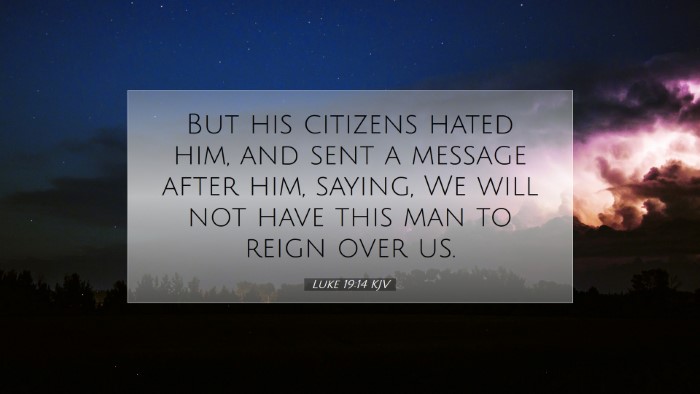Commentary on Luke 19:14
Verse: "But his citizens hated him, and sent a message after him, saying, We will not have this man to reign over us."
Introduction
This verse is a crucial part of the parable of the ten minas, as narrated in the book of Luke. It illustrates the rejection of authority and the resistance to the governance of Christ. The profound implications of this rejection resonate deeply with the Christian faith and its understanding of human response to divine reign.
Contextual Background
The parable occurs during Jesus’ final journey to Jerusalem, a pivotal backdrop that signifies the nearing culmination of His earthly ministry. The mention of the citizens’ hatred serves not only as a narrative device but also reflects the historical enmity that Jesus faced, especially from the religious leaders of His time. This animosity culminates in His ultimate rejection and crucifixion, mirroring the rejection of God's authority throughout biblical history.
Analysis of Key Themes
1. Human Rebellion Against God
Matthew Henry emphasizes the intrinsic rebellion of mankind against divine authority. Henry remarks that the citizens’ proclamation embodies the age-old human tendency to resist God's rightful reign. He equates this resistance to the sin of refusing God's sovereignty, which has been a recurrent theme throughout scripture.
2. The Nature of Authority
Albert Barnes elaborates on the idea of authority in leadership. He interprets the citizens' refusal as indicative of a broader human condition—the desire for autonomy. Barnes contests that authority, especially divine, is often viewed with suspicion and rejection due to inherent sinful nature.
3. Theological Implications
Adam Clarke points to the theological ramifications of this denial of authority. He suggests that this rejection typifies the attitude towards God’s kingdom in the hearts of many. Clarke asserts that the rejection of Jesus as Lord was not merely a political statement but a spiritual one—a refusal to submit to God's will and governance.
Insights for Pastors and Theologians
- Pastoral Application: This verse serves as a profound reminder for pastors to address the hearts of their congregations regarding submission to God's authority. It challenges both leaders and members to evaluate their relationship with Christ as King.
- Exegesis and Teaching: The interplay of rejection and authority found in this verse provides rich material for bible study. When teaching, scholars should highlight how the parable reflects contemporary cultural attitudes towards authority, especially in light of secularism.
- Preaching: This text can be used to examine the greater narrative of Christ's kingship, preparing a sermon that explores why Jesus continues to be rejected today, both personally and corporately.
Conclusion
Luke 19:14 encapsulates essential theological truths about the relationship between God and humanity. The actions of the citizens shed light on the human propensity to resist authority and the implications of such resistance. For pastors, students, and theologians, this verse invites ongoing reflection and exploration of how authority is understood and embraced within the framework of faith. It provides an opportunity to engage deeply with Scripture, recognizing the ancient resistance that still resonates today, and calling for a renewed submission to the lordship of Christ.


